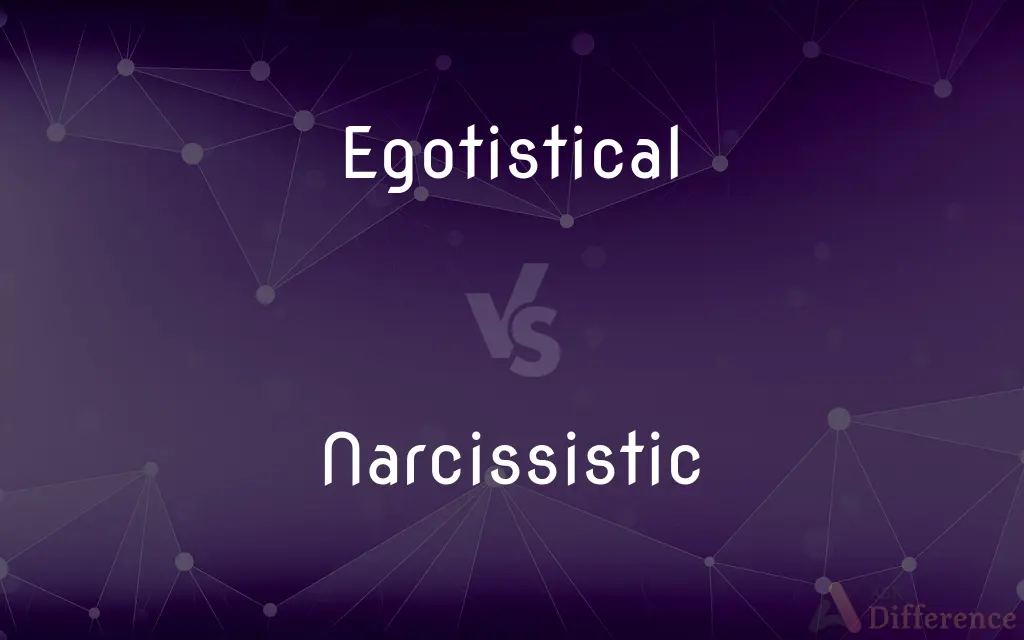Egotistical vs. Narcissistic — What's the Difference?
By Tayyaba Rehman & Fiza Rafique — Updated on March 19, 2024
Egotistical individuals prioritize self-importance, often displaying arrogance; narcissistic individuals, however, have a deeper need for admiration and lack empathy.

Difference Between Egotistical and Narcissistic
Table of Contents
ADVERTISEMENT
Key Differences
Egotistical behavior is characterized by an inflated sense of self-importance and often involves bragging or boasting to assert superiority. On the other hand, narcissistic individuals not only feel superior but also have a profound need for excessive attention and admiration from others.
Egotistical people may not always require the validation of their self-worth from others, as their self-centered attitude can stem from an overconfidence in their abilities or achievements. Whereas narcissists thrive on external validation and often engage in manipulative behaviors to maintain a facade of perfection.
While egotistical individuals can be overly confident and self-absorbed, they might still possess some level of empathy and concern for others. Narcissistic individuals, however, typically lack empathy, making it difficult for them to recognize or care about the feelings and needs of others.
Egotism can manifest as a personality trait that does not necessarily affect one's relationships in a deeply negative way; it might simply lead to arrogance or self-promoting behavior. Narcissism, particularly in its more severe forms as Narcissistic Personality Disorder (NPD), can lead to significant interpersonal problems, including exploitation of relationships and a lack of genuine intimacy.
Egotistical people often believe they are better than others, but this belief does not usually come with the fragile self-esteem seen in narcissistic individuals. Narcissists' sense of superiority is deeply tied to others' perceptions, causing them to react negatively to criticism or perceived slights.
ADVERTISEMENT
Comparison Chart
Self-Importance
High; often expressed openly
Extremely high; needs to be recognized by others
Validation
May not need external validation
Requires constant external validation
Empathy
Might have some level of empathy
Lacks empathy, struggles to understand others' feelings
Impact on Relationships
Can strain relationships; not always severe
Often leads to significant interpersonal issues
Reaction to Criticism
May be dismissive or indifferent
Reacts poorly, with hostility or manipulation
Compare with Definitions
Egotistical
Believing oneself to be superior or more important than others.
The egotistical manager rarely acknowledged her team's contributions.
Narcissistic
Possessing a grandiose sense of self-importance.
The CEO's narcissistic belief in his infallibility led to the company's downfall.
Egotistical
Often talking about oneself without considering others.
His speeches were egotistical, focusing only on his achievements.
Narcissistic
Needing excessive admiration and attention.
His narcissistic need for compliments was exhausting for his friends.
Egotistical
Having an excessive sense of self-importance.
His egotistical demeanor made it difficult to work collaboratively.
Narcissistic
Being preoccupied with fantasies of success, power, or beauty.
He lived in a narcissistic bubble, dreaming of unwarranted fame.
Egotistical
Demonstrating arrogance or boastfulness.
Her egotistical claims about her skill level annoyed her colleagues.
Narcissistic
Lacking empathy towards others.
Her narcissistic attitude made her indifferent to her partner's feelings.
Egotistical
Acting with self-centeredness.
He made egotistical decisions without consulting the team.
Narcissistic
Exploiting relationships for personal gain.
She used her charm narcissistically to advance her career.
Egotistical
A conceited, boastful person.
Narcissistic
Excessive preoccupation with or admiration of oneself.
Egotistical
A selfish, self-centered person.
Narcissistic
A personality disorder characterized by an exaggerated sense of self-importance, need for admiration, and lack of empathy. Also called narcissistic personality disorder.
Egotistical
Tending to talk excessively about oneself.
Narcissistic
Pleasure derived from contemplation or admiration of one's own body or self, considered in psychoanalytic theory to be a fixation on or a regression to an infantile stage of development.
Egotistical
Believing oneself to be better and more important than others due to one's position, popularity, wealth, appearance, etc.
Narcissistic
Having an inflated idea of one's own importance.
Egotistical
Egoistical advocating egoism.
Narcissistic
Obsessed with one's own self image and ego.
Egotistical
Characteristic of those having an inflated idea of their own importance
Narcissistic
A narcissist.
Egotistical
Characteristic of false pride; having an exaggerated sense of self-importance;
A conceited fool
An attitude of self-conceited arrogance
An egotistical disregard of others
So swollen by victory that he was unfit for normal duty
Growing ever more swollen-headed and arbitrary
Vain about her clothes
Narcissistic
Having an excessive love of oneself; egocentric; egoistic.
Narcissistic
Characteristic of those having an inflated idea of their own importance
Common Curiosities
Can someone be both egotistical and narcissistic?
Yes, individuals can exhibit traits of both egotism and narcissism, though they are distinct in their core characteristics.
Can egotism be a positive trait?
While often viewed negatively, a mild form of egotism can drive individuals to achieve goals, though excessive egotism is generally harmful.
Is narcissism a mental disorder?
Narcissistic Personality Disorder (NPD) is recognized as a mental disorder characterized by extreme narcissistic traits, but not all narcissistic behavior meets the criteria for NPD.
How does society view egotistical and narcissistic behaviors?
Society often views both behaviors negatively, but narcissistic behaviors are generally seen as more damaging to relationships and social dynamics.
Why is narcissism considered more harmful than egotism?
Narcissism can lead to significant interpersonal problems due to the lack of empathy and exploitative behaviors, making it more harmful in relationships.
What motivates narcissistic behavior?
Narcissistic behavior is motivated by a need for excessive admiration, attention, and the validation of their self-worth by others.
What are the social implications of narcissism?
Narcissism can lead to significant social and interpersonal difficulties, including manipulation of relationships and lack of genuine connections.
What is the main difference between egotistical and narcissistic?
The main difference is that narcissism involves a deeper need for admiration and lacks empathy, whereas egotism is more about an inflated sense of self-importance.
How does egotism affect relationships?
Egotism can strain relationships due to arrogance and self-centered behavior, but it might not always have severe negative effects.
Can egotistical people empathize with others?
Egotistical individuals might still possess some level of empathy, allowing them to understand or share others' feelings to a degree.
How do narcissistic individuals react to criticism?
Narcissistic individuals often react poorly to criticism, potentially with hostility or manipulation, due to their fragile self-esteem.
How is empathy different between egotistical and narcissistic individuals?
Egotistical individuals might have some empathy, whereas narcissistic individuals typically lack empathy altogether.
Is it easy to identify narcissistic or egotistical traits in someone?
Identifying these traits can be challenging, as they can be subtle or masked by charm and charisma in social situations.
Is there a genetic component to narcissism or egotism?
Research suggests that both environmental and genetic factors can influence the development of narcissistic and egotistical traits.
Can therapy help with narcissistic or egotistical traits?
Therapy can be beneficial in addressing and managing both narcissistic and egotistical traits, helping individuals understand and improve their behaviors.
Share Your Discovery

Previous Comparison
Subtract vs. Sum
Next Comparison
Bakery vs. BakerAuthor Spotlight
Written by
Tayyaba RehmanTayyaba Rehman is a distinguished writer, currently serving as a primary contributor to askdifference.com. As a researcher in semantics and etymology, Tayyaba's passion for the complexity of languages and their distinctions has found a perfect home on the platform. Tayyaba delves into the intricacies of language, distinguishing between commonly confused words and phrases, thereby providing clarity for readers worldwide.
Co-written by
Fiza RafiqueFiza Rafique is a skilled content writer at AskDifference.com, where she meticulously refines and enhances written pieces. Drawing from her vast editorial expertise, Fiza ensures clarity, accuracy, and precision in every article. Passionate about language, she continually seeks to elevate the quality of content for readers worldwide.














































